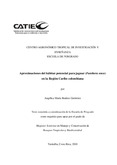| dc.contributor.author | Benítez Gutiérrez, Angélica M. | |
| dc.date.accessioned | 2014-10-20T04:11:48Z | |
| dc.date.available | 2014-10-20T04:11:48Z | |
| dc.date.issued | 2010 | es_ES |
| dc.identifier | 374243 | es_ES |
| dc.identifier.uri | https://repositorio.catie.ac.cr/handle/11554/4515 | |
| dc.identifier.uri | http://orton.catie.ac.cr/repdoc/A3786e/A3786e.pdf | es_ES |
| dc.description | Tesis (M.Sc) -- CATIE, Turrialba (Costa Rica), 2010 | es_ES |
| dc.description.abstract | y se recopiló a partir de fuentes secundarias 70 datos de presencia de jaguar para todo el Caribe colombiano.A través de un análisis multicriterio y el algoritmo de máxima entropía (Maxent) se generaron tres mapas de hábitat potencial, donde se observó una baja disponibilidad de hábitat con calidad potencial alta para jaguar (< 7.000 km2), siendo el uso del suelo y las variables socieconómicas las que más aportaron a los modelos obtenidos. Este estudio pretendió generar información sobre el hábitat potencial del jaguar en el Caribe colombiano, región que cubre una extensión de 132.000 km2 aproximadamente. Además se buscó caracterizar los conflictos que existen entre las comunidades humanas y la fauna silvestre en dos zonas donde existen remanentes de bosques naturales de gran importancia para los pobladores. Se consideraron variables biofísicas, climáticas y socioeconómicas Thus, this study pretended to generate information about the potential habitat of jaguar in the Colombian Caribbean, a region with 132.000 km2. On the other hand, conflicts between human communities and wildlife were characterized in two zones where there are still remnants of natural forests with great importance for the development of the region. Biophysical, climatic and socioeconomic variables were considered, and 70 data of jaguar’s presence were compiled from different secondary sources.Three maps of potential habitat for jaguar generated through a multi-criteria analysis and the Maximum Entropy Algorithm (Maxent) allowed concluding that the region has a low availability of habitat with a high potential quality for the species (< 7.000 km2). The variables that most contributed in the models were land use, settlements density and distance to settlements. | es_ES |
| dc.language.iso | es | es_ES |
| dc.publisher | CATIE, Turrialba (Costa Rica) | es_ES |
| dc.subject | CARIBE | |
| dc.subject | FELIDAE | |
| dc.subject | HABITAT | |
| dc.subject | ESPECIES EN PELIGRO DE EXTINCION | |
| dc.subject | CONSERVACION DE LA NATURALEZA | |
| dc.subject | ORDENACION DE LA VIDA SILVESTRE | |
| dc.subject | CAZA | |
| dc.subject | MODELOS | |
| dc.subject | COSTA RICA | |
| dc.title | Aproximaciones del hábitat potencial para jaguar (Panthera onca) en la Región Caribe Colombia | es_ES |
| dc.type | Tesis de maestría | es_ES |
| dc.identifier.publication | Turrialba (Costa Rica) | es_ES |


